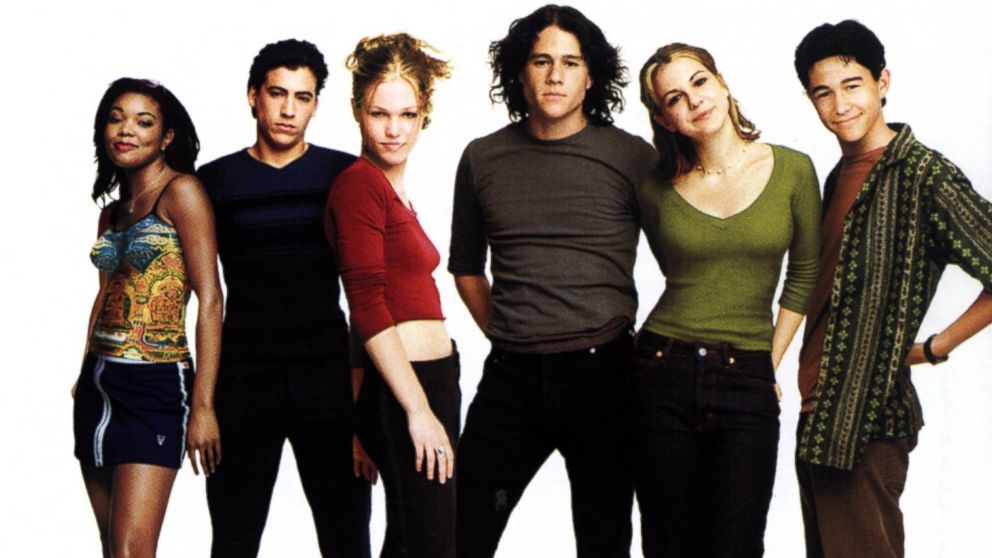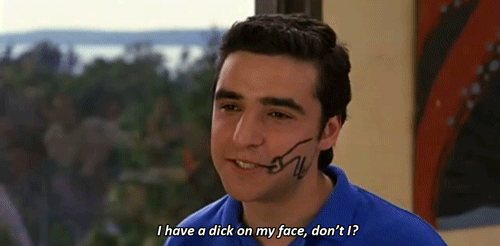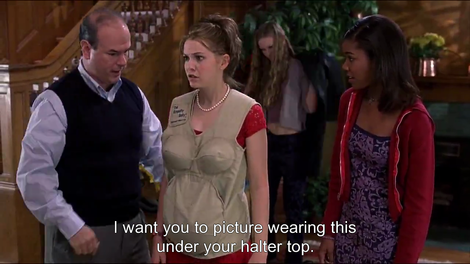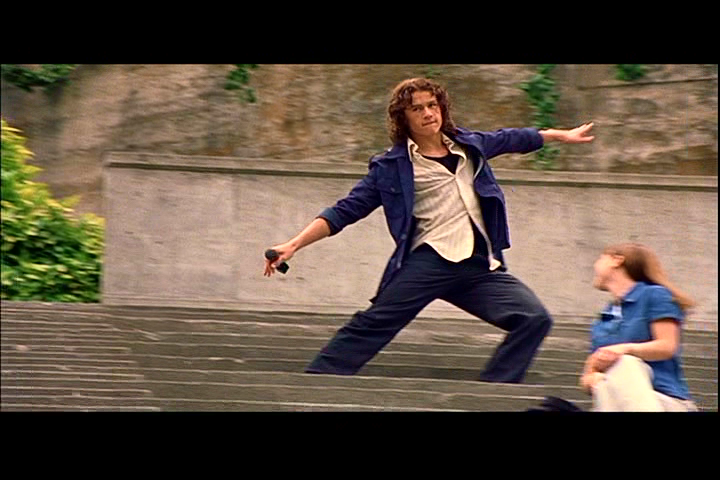How Does This Hold Up? is a series where Alex and a guest check out a movie they haven’t seen in ages or that they’ve always been meaning to watch. They’ll compare the experience of watching these movies now to when they first saw or heard of them and explore the differences there-in.
Alex: Hello again! We’re following up our last installment by bringing in the other half of The Addison Recorded‘s first season: Gina Watters. We’re also watching a youth-oriented movie that’s mildly seminal for the folks who came of age around the turn of the millennium: 10 Things I Hate About You. Gina, you suggested a film like this one because you’re a couple years older than me, so our perspectives on ostensibly youth-oriented films like this one might feel drastically different since I was growing into the age of the high schoolers in 10 Things right as you were leaving that age behind. So with that established, I’ll kick it to you: what was your relationship with this movie? Did you even see it when it first came out back in 1999?
Gina: I did indeed. I saw it in the theater during my freshman year of college and I remember liking it. Watching it again, I have to say it might be the most “of its time” movie ever made. It is absolutely dripping with 1999. Not just the clothes and music, but there is just this late-90s vibe I kept picking up on that I’m struggling to describe. I mean, it’s a comedy, but there are actually very few laughs. There’s a very self-serious tone and a faux angst that I don’t think is supposed to be funny or ironic. Maybe it’s the really clunky way it tries to shoehorn in Shakespeare references at every turn? Although, I did appreciate the plethora of universal teen comedy tropes, such as the requisite scene where a character points out who all the cliques are to the new kid in school.
I was already done with high school when this movie came out, and it sounds like you were about to enter it. Did you think high school was going to be anything like it is in this film?
Alex: Working out the timetable in my head, this was actually released when I was only in 6th Grade. It would be another two years after 10 Things came out before I entered high school. I now feel very old and young all at once. So weird. Anyway, it must have affected me on some level, because I seem to recall returning to the movie a few times through those middle school years. I’d like to think that I was smart enough not to really fall for Hollywood, but that is clearly untrue even today (see: me wondering what kind of role I’d have in the Mad Max-verse after seeing Fury Road last week). So that leaves me to deduce what in here I was hoping getting “older” would be like. The Joseph Gordon-Levitt character is my clearest role model, since no part of me ever believed that being a Heath Ledger-esque Lothario was ever in the cards for me. JGL playing essentially the same role and pursuing the same actress (Larisa Oleynik) he did on 3rd Rock from the Sun, my favorite show at the time, must have helped as well. Easy to see why the story of a smart, but not naturally “cool,” guy getting his dream girl would win me over at age 12.
Beyond that, I agree with what you mentioned about this movie feeling like a pure distillation of 1999, Gina. It already feels like a time-capsule in the big ways you mentioned, but in some oddly tiny and specific ones as well. Ledger, who Hollywood tried making into a traditional romantic leading man after this came out, is clearly modeling his character on the long-haired and angst-ridden leading men of grunge like Kurt Cobain and Eddie Vedder. Their cultural moment was already sliding into the rearview mirror by 99 (Editor’s Note – Heh, Eddie Vedder, rearviewmirror…yeah, I’m the only one who saw an unintentional Pearl Jam joke. – Travis), but it obviously still had some powerful appeal. I’m betting the Seattle setting helped there, as well. Similarly, Julia Stiles gets much of her characterization from being a Riot Grrl-style feminist. Any outspoken feminists in a teenage comedy are awesome, of course, and I liked the way the screenplay made her character feel three-dimensional and not just 100% shrew. But she also feels like a representation of an already-bygone era when a whole type of young women could be understood by the particular type of pop-punk they liked. There’s even some whiplash from seeing actors like David Krumholtz or Gabrielle Union playing teenagers. He’s already playing people approaching middle age and she might be better known these days for being married to Dwayne Wade. It was positively bizarre to reconcile that with them going to prom. Plus, you know, all those terribly 1999 outfits and hair-dos. They hold up better than any looks from John Hughes’ 80’s teen comedies, but still.
Anyway, Gina, what were your overall thoughts on the movie? You mentioned that it’s a comedy which is light on the actual laughs. What else stood out to you?
Gina: Egads, 6th grade? I think you were too young for this film and I was too old. Interesting that we both liked it at the time though. Ditto on the clothes and hair. I’m happy the floppy hair and chunky shoe era is behind us. I’m glad you brought up the ’90s-era feminism because as an angsty teen myself at the time, I, of course, thought that Kat was super awesome. However, watching it as a 30-something, I find her a lot less inspiring. She’s painted as a shrill, joyless harpy, which somehow did not come across to me when I first saw it. I had recalled this film as being pretty forward-thinking in terms of gender, but in my opinion, it has not aged well in that respect. I mean, the entire plot revolves around a bunch of dudes manipulating women for access to sex and money, and even when uber-feminist Kat gets wind of their machinations, all is forgiven with an expensive gift! I was sort of blown away by how much this movie tried to be progressive by just having Kat as an outdated caricature of a feminist, (whose righteous indignation we learn is actually just the negative byproduct of a guy screwing her over freshman year), when really it’s actually pretty pretty backward in terms of gender politics in a broader sense. I cringed hard core when the Patrick, the “good guy” in the story, refers to Riot Grrl bands as “chicks who can’t play their instruments”. Also, as you mention about a bygone era, Kat’s brand of feminism is so bizarrely second-wave, hilariously illustrated by the mention of Betty Friedan’s The Feminine Mystique (try finding a feminist who’s referenced that particular tome post-1985). I had to go back and see if the screenplay was written by a male Baby Boomer and was absolutely shocked that it was not. However, it was comforting to realize how much my own feminist sensibilities, and those of the world at large, have evolved since 1999. These days, Kat’s oeuvre would be very different and she’d have allies throughout the school of both genders. I will say though, I continue to covet her long black leather jacket as much now as when I was teen.

Also, this film also tore open a very old wound for me that I thought had healed. Like Kat, I was accepted to Sarah Lawrence College, and I remember being even more excited than her the day my welcome letter arrived. Alas, even with every possible loan and financial aid package available, I couldn’t afford to go. I distinctly remember watching this movie during my freshman year at my state school, and when the SLC part came up it was like a dagger to the heart! Watching it again, sixteen years later, it still stung a little. Ah, well. I turned out ok I guess. Go Spartans!
Also, I can totally see you as the JGL character in high school. I was probably a combination of Kat and David Krumholtz’ character (sans motorbike). So, Alex, other than how sad it is to see Heath Ledger again, did we miss anything?
Alex: There was one last thing I wanted to mention. The writing here can be fairly clunky at times: consider the shoe-horned Shakespeare references, out-dated sexual politics, and by-the-numbers teen movie tropes (student types tour, embarrassingly romantic declaration of affection, climactic dance, etc). But I did think the screenwriters did a fairly nimble job of transposing Shakespeare’s overly-complicated plot into a contemporary setting and making the character motivations believable. It’s easy to overlook how tough it can be to capably set up character development, foreshadowing, and converging sub-plots. On this rewatch, I thought 10 Things pulled all that off pretty well, especially when you consider how many characters it juggles. I’d bet it holds up especially well in comparison to the other teen movies of that era like American Pie or Drive Me Crazy.
But I think we’re in overall agreement here.









